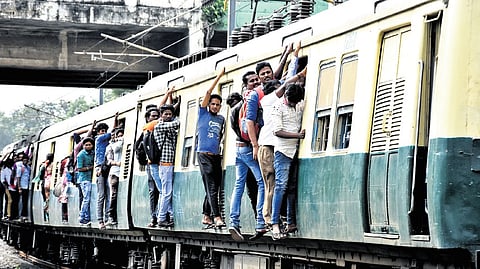

CHENNAI: After remaining only on paper for two decades due to ventilation concerns, Indian Railways has finally decided to study the implementation of automatic doors in non-AC local trains. The move comes close on the heels of the tragic incident in Mumbai on Monday in which six commuters from suburban trains were killed.
The Integral Coach Factory (ICF), which is working on rolling out two non-AC Electric Multiple Unit (EMU) trains with automatic doors for deployment in Mumbai, will adopt roof-mounted ventilation and louvered doors to overcome the ventilation problem.
Officials said if the initiative proves successful, the railways may scale up production of these rakes in the coming years and introduce them in Chennai’s suburban network as well.
The demand for automatic doors in suburban trains is repeatedly raised whenever passenger fatality occurs in the Mumbai or Chennai suburban network due to overcrowding and footboard travel, but it has never gained traction.
For over two decades, a section of railway engineers had consistently dismissed these proposals, citing concerns over passenger discomfort and potential risks of suffocation due to inadequate airflow in densely packed coaches, said sources.
In July 2018, in two different incidents, seven passengers who travelled hanging on the footboards of local trains on the Chennai-Tambaram route were killed after striking a concrete wall at the St Thomas Mount station. Following an investigation, the then commissioner of Railway Safety dismissed the possibility of installing automatic doors in non-AC local trains, citing concerns over inadequate air circulation.
The Mumbai suburban trains carry about 55 to 60 lakh passengers daily, whereas Chennai’s patronage stands at 11 lakh. The Mumbai suburban train network is classified as a “super dense crush load” zone, where passenger density reaches up to 16 people per m2, which is double the standard dense crush load of eight passengers per m2.
ICF general manager U Subba Rao told TNIE that as per the Railway Board’s directive on Monday, two 12-car EMU rakes with automatic doors are scheduled to be rolled out by November.
“To resolve the air circulation problem, we will install roof-mounted ventilation systems. Each coach will have two such units for air intake, and the doors will feature louvered designs to allow air to pass through, unlike the sealed glass doors used in AC local trains,” he explained.
Rao said the modifications have been made to the 12-car EMU rake design, keeping in mind the overcrowding during peak hours. The upgraded rakes will include door-linking mechanisms with the driver’s cabin, installation of censors, a talkback system, passenger information displays, and improved ventilation. “The design work is nearly complete,” he added.
The manufacturing cost of these upgraded rakes will be 10-15% higher than standard local trains, Rao added.
Official data indicates that over 2,500 passengers get killed in the Mumbai suburban network every year after falling from overcrowded trains. The Chennai suburban network records an average of 400 passenger fatalities annually, primarily due to trespassing and falls from packed trains.